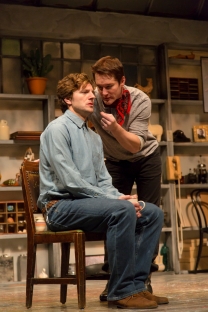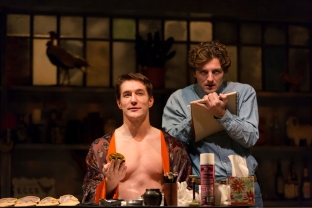
Nureyev’s Eyes
by David Rush
directed by Michael Mastro
George Street Playhouse
New Brunswick, NJ
February 2–21, 2016
Review by C. Todd White
February 14, 2016.
Everyone expected that James Wyeth would become a great painter.
Grandson to N.C. Wyeth, remembered for his bold illustrations of Stevenson’s Treasure Island, and son to Andrew, who was one of the most iconic American painters of the twentieth century, Jamie was raised in the shadow of greatness, passionate for his art and talented in his own right yet always measured against a standard that seemed impossible to achieve.
Though often (and happiest) in a spotlight, ballet dancer Rudolf Nureyev was also a man of the shadows, glancing forever behind him for fear of the KGB after defecting from Russia to the west in 1961—and forever coming up second to the equally talented yet far more personable Baryshnikov.
Nureyev and Wyeth first met in 1974, through mutual friend Lincoln Kirstein, cofounder of the New York City Ballet. Wyeth decided immediately to attempt to capture Nureyev’s tempered animality on canvas, if only the famed dancer would sit still long enough to be sketched. Wyeth had access to Kirstein, which Nureyev craved—so each had something the other desired.
Three years later, Wyeth was finally granted access to Nureyev, and after a contentious “courtship” they remained friends until Nureyev’s death from AIDS in 1993. This play explores the dynamics of this unlikely pairing.
Nureyev’s Eyes is a dialogical exploration of the tensions inherent in both art and life, most especially the conflicts between insider vs. outsider and doing vs. observing. The script, by David Rush, is exceptionally well composed. Nureyev’s quips, such as “Is no sin to be straight, only limiting,” and an ongoing contest of riddles keep the play moving as the two artists negotiate the creative process from entirely different perspectives. Rush, who teaches playwriting, knows exactly when and how to punch his theme through the banter, as when a frustrated Nureyev proclaims to the stagnant artist:
Soon or late, must start ballet or else is a lie; is all dead. Either sketch life of live life. Can’t do both.
Under Michael Mastro’s direction, the rapport between the two actors is palpable and real. Kudos especially to Bill Dawes, who truly channels the essence of this crazy-famous dancer and brings grace to the stage through Charlie Williams’ eloquent choreography. William Connell’s performance of Jamie Wyeth was equally compelling—I left the theatre desiring to know more about both of these men, their extended bromance, and the history of their art.
 One can always count on George Street Playhouse for a dynamic presentation, and the stage, sounds, and lights were all well tended in this show. The stage, which is called to represent various settings, borders on the kitsch and is spangled with items and gadgets evocative of an artist’s studio. While the effect on the eye is impressive, the set seems to lock the performance in time and perhaps overplays the theme of stasis just a bit.
One can always count on George Street Playhouse for a dynamic presentation, and the stage, sounds, and lights were all well tended in this show. The stage, which is called to represent various settings, borders on the kitsch and is spangled with items and gadgets evocative of an artist’s studio. While the effect on the eye is impressive, the set seems to lock the performance in time and perhaps overplays the theme of stasis just a bit.
Indeed, apart from the final scenes of the play, where Nureyev’s health begins to fail, the characters seem almost stuck in time. Connell especially looks the exact same at the end of the play as he did at the outset (boyishly handsome from start to last to be sure), and this belies the twenty-year span the play represents and undercuts the sense of maturation on his part. This quirk, however, is minor compared to force of Rush’s prose and the impeccable acting by these two extremely talented men.
Nuryev’s Eyes is a new play, having debuted in the fall of 2014. It was awarded Best Play in the 2012 Festival of New American Plays contest at the Firehouse Theatre Project in Richmond, Rush’s second time to earn that award.
The play runs though February 21 at George Street Playhouse, and tickets start at $25.
©2016 by The Tangent Group.
This review was formally published by Out In Jersey magazine.
All rights reserved.

